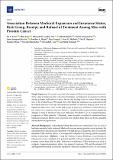Association Between Medicaid Expansion and Insurance Status, Risk Group, Receipt, and Refusal of Treatment Among Men with Prostate Cancer
Author(s)
Patel, Tej A.; Jain, Bhav; Dee, Edward Christopher; Kohli, Khushi; Ranganathan, Sruthi; Janopaul-Naylor, James; Mahal, Brandon A.; Yamoah, Kosj; McBride, Sean M.; Nguyen, Paul L.; Chino, Fumiko; Muralidhar, Vinayak; Lam, Miranda B.; Vapiwala, Neha; ... Show more Show less
Downloadcancers-17-00547.pdf (1.268Mb)
Publisher with Creative Commons License
Publisher with Creative Commons License
Creative Commons Attribution
Terms of use
Metadata
Show full item recordAbstract
Simple Summary
We sought to quantify the impact of Medicaid expansion on insurance status, stage at diagnosis, time to treatment initiation, and refusal of locoregional treatment among patients with prostate cancer, the second leading cause of cancer death among men in the United States. We found that while Medicaid expansion was associated with increased insurance coverage and decreased refusal of radiation therapy, there was no significant association with earlier risk group at diagnosis, treatment within 180 days, nor refusal of locoregional therapy. Similarly, racial minorities experienced no significant changes in time to treatment initiation following Affordable Care Act implementation compared to White patients. Ultimately, more research is needed to understand how Medicaid expansion affects cancer outcomes and whether these effects are borne equitably among different populations.
Abstract
Background: Although the Patient Protection and Affordable Care Act (ACA) has been associated with increased Medicaid coverage among prostate cancer patients, the association between Medicaid expansion with risk group at diagnosis, time to treatment initiation (TTI), and the refusal of locoregional treatment (LT) among patients requires further exploration. Methods: Using the National Cancer Database, we performed a retrospective cohort analysis of all patients aged 40 to 64 years diagnosed with localized prostate cancer from 2011 to 2016. Difference-in-difference (DID) analysis was used to compare changes in insurance status, risk group at diagnosis, TTI, and the refusal of LT among patients residing in Medicaid expansion versus non-expansion states. In a secondary analysis, we used DID to compare changes in the above outcomes among racial minorities versus White patients living in expansion states. Results: Of the 112,434 patients with prostate cancer in our analysis, 50,958 patients lived in Medicaid expansion states, and 61,476 patients lived in non-expansion states. In the adjusted analysis, we found that the proportion of uninsured patients (adjusted DID: −0.87%; 95% confidence interval [95% CI]: −1.28 to −0.46) and patients who refused radiation therapy (adjusted DID: −0.71%; 95% CI: −0.95 to −0.47) decreased more in expansion states compared to non-expansion states. Similarly, we observed that the racial disparity of select outcomes in expansion states narrowed, as racial minorities experienced larger absolute decreases in uninsured status and the refusal of radiation therapy (RT) regimens than White patients following ACA implementation (p < 0.01 for all). However, residence in a Medicaid expansion state was not associated with changes in risk group at diagnosis, TTI, nor the refusal of LT (p > 0.01 for all); racial disparities in TTI were also exacerbated in expansion states following ACA implementation. Conclusions: The association between Medicaid expansion and prostate cancer outcomes and disparities remains unclear. While ACA implementation was associated with increased insurance coverage and decreased refusal of RT, there was no significant association with earlier risk group at diagnosis, TTI within 180 days, or refusal of LT. Similarly, racial minorities in expansion states had larger decreases in uninsured status and the refusal of RT regimens, as well as smaller increases in intermediate-/high-risk disease at presentation than White patients following ACA implementation, but experienced no significant changes in TTI. More research is needed to understand how Medicaid expansion affects cancer outcomes and whether these effects are borne equitably among different populations.
Date issued
2025-02-06Journal
Cancers
Publisher
Multidisciplinary Digital Publishing Institute
Citation
Patel, T.A.; Jain, B.; Dee, E.C.; Kohli, K.; Ranganathan, S.; Janopaul-Naylor, J.; Mahal, B.A.; Yamoah, K.; McBride, S.M.; Nguyen, P.L.; et al. Association Between Medicaid Expansion and Insurance Status, Risk Group, Receipt, and Refusal of Treatment Among Men with Prostate Cancer. Cancers 2025, 17, 547.
Version: Final published version